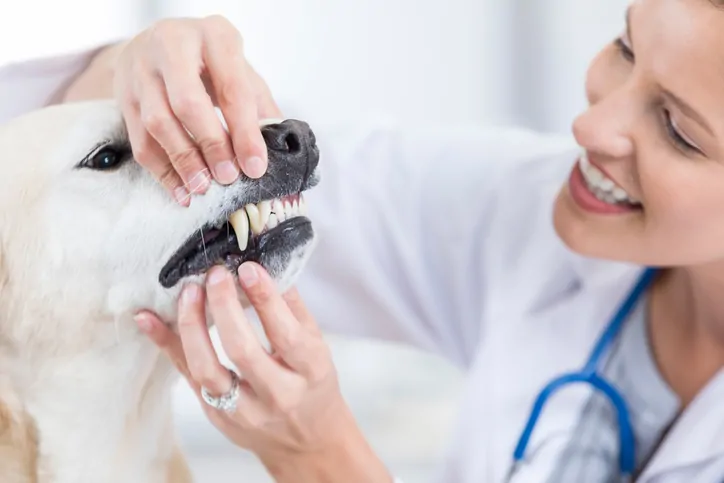Stinky breath in dogs may be caused by periodontal disease that can result in tooth loss, abscesses, and systemic infections.
Yes. Neglecting your dog's dental care may cause serious health issues that can take years off their life.
Proper dental care for dogs includes regular examinations and frequent at-home dental hygiene, as well as dental cleanings by your vet as needed.
Brushing your dog's teeth with a vet-approved toothpaste at least two or three times a week is the best way to care for your dog's teeth at home.
If your dog resists brushing, you can give them treats, chews, and food additives that help scrape tarter off their teeth as they chew and promote healthy bacteria.
Canine dental disease caused by poor dental hygiene is a common problem faced by the majority of dog owners. Most dogs begin to exhibit symptoms of canine periodontal disease by the age of three. Dog guardians ignore their pet's foul breath because they believe that it's natural for it to be stinky. But, bad breath in dogs is usually the earliest warning sign of periodontal disease. Untreated dental disease can result in tooth loss, excruciating abscesses, and systemic infections that affect every part of your dog's body. Periodontal disease also increases the risk of canine heart disease and can cause permanent jaw damage.
Periodontal disease in dogs is irreversible and can take up to two years off your dog's life. However, there are things that you can do to prevent periodontal disease or even help slow disease progression when combined with veterinary treatment.

Brushing your dog's teeth is a great way to stop plaque from accumulating and prevent periodontal disease. Although it's best to brush frequently, you don't have to clean your dog's teeth every day. Your dog may resist having their teeth brushed at first, but, with patience and consistency, they can be trained to accept the process without much fuss.
Using toothpaste flavored to appeal to a dog's taste receptors can help make them more cooperative, and is necessary because human toothpaste has ingredients that are toxic to pets. The three most preferred tastes of doggy toothpaste are chicken, beef, and peanut butter. Be cautious of your pet's food sensitivities when choosing their toothpaste flavor.
Taking care of your dog's teeth is like taking care of your own. Moisten the toothbrush, dab some toothpaste on it, and then brush your dog's teeth. Don't worry if your dog will not allow you to brush the inside of their teeth, and you don't have to rinse the toothpaste from their mouth when you're done brushing. You can use a standard human toothbrush on large dogs but it is advisable to use a fingertip brush or a baby toothbrush when brushing little pets.
Do not attempt to brush your dog's teeth if you are worried that they may bite you. Try some of the following alternatives instead.
Fluoride is toxic to pets. Only use toothpaste made for animals. Ask your veterinarian for toothpaste.
A great method to enhance your dog's oral health is by giving him dental treats. Dog dental treats are designed to eliminate plaque buildup and include chemicals that help your dog's breath and mouth stay fresh and clean. You can find dental treats in a range of colors, textures, and flavors that your dog is sure to appreciate.
There are countless varieties of dog chews, and all contain teeth-cleaning qualities. The act of chewing in itself is good for your dog's oral health. The chewing removes plaque from your dog's teeth, and a lot of natural meat-based chews also contain enzymes that support dental health. Many durable rubber or nylon dog chew toys are also effective if you're searching for something with no calories.
Give your pet chews and raw hides formulated by veterinary dentists and under supervision.
A few dog food manufacturers produce prescription dental food, which has been clinically proven to help minimize dental disease for dogs that don't like brushing or are especially vulnerable to periodontal disease. As your dog chews, the kibble cleans the surface of their teeth, preventing the formation of tartar. Ingredients in the kibble also aid in eradicating bacteria that cause plaque and tartar to form. You may need to talk to your vet about these dental diet formulas for your dog because they often require a prescription from a vet.
Flavored dental powders can also help you protect your dog's dental health with probiotics that promote healthy bacteria and kill the bacteria that cause plaque. As a result, these powders help your dog's breath smell better and keep plaque and tartar from forming on their teeth. You can apply the powder to your dog's food as instructed by the product's instructions.
There are a variety of water additives that all function quite similarly. These oral medications have no flavor and can be added to your pooch's water bowl as directed by the instructions on the bottle. You should add a specific quantity of the water addition to your dog's water bowl each day in accordance with the instructions on the bottle. The remedy eliminates plaque-forming bacteria in your dog's mouth while also helping to freshen their breath.
The best way to safeguard your dog's oral health is to have regular dental examinations performed by your pup's veterinarian. Veterinarians have dentistry training that allows them to recognize dental health issues that may go unnoticed by even the most devoted dog owner. Your vet will recommend a dental cleaning when your dog's mouth shows signs of too much tartar build-up or emerging gingivitis. To effectively remove all the tartar from your dog's teeth and under their gum line, a veterinarian will need to put your dog under general anesthesia. Most dogs need a dental cleaning every two or three years, even if they have regular dental hygiene at home.
Phone: (855) 461-8259
Email: [email protected]